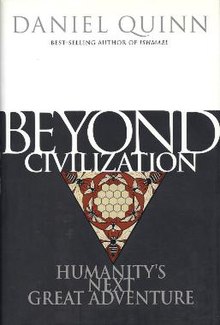Beyond Civilization

First edition
|
|
| Author | Daniel Quinn |
|---|---|
| Country | United States |
| Language | English |
| Publisher | Harmony Books |
|
Publication date
|
1999 |
| Media type | Print (Paperback) |
| Pages | 202 pp |
| ISBN | |
| OCLC | 45617313 |
| Preceded by | Ishmael, The Story of B, My Ishmael |
Beyond Civilization (subtitled Humanity’s Next Great Adventure) is a book by Daniel Quinn written as a non-fiction follow-up to his acclaimed Ishmael trilogy—Ishmael, The Story of B, and My Ishmael—as well as to his autobiography, Providence: The Story of a Fifty-Year Vision Quest. Beyond Civilization is written both to illuminate further the arguments and ideas made in his previous books and as a sort of guide to offer possible solutions to the problems he sees with the current state of civilization.
Beyond Civilization is Quinn's foremost text on new tribalism. The book contains one-page explorations into a variety of topics, in the form of reflections, parables, autobiographical accounts, short essays, and deliberate clarifications of ideas introduced in his previous books.
Within the main body of Beyond Civilization, each page contains its own chapter-like heading and a few paragraphs exploring the topic of that heading. The book as whole is divided into seven parts:
Quinn states his reasons for writing the book and focuses on clarifying his idea in The Story of B that “If the world is saved, it will not be by old minds with new programs but by new minds with no programs at all.” He articulates how successful situations often have no visible indicators and that this is true in the community of life whose successes, in general, through natural selection are easy to overlook. He expands upon the nature of his idea of a cultural “vision,” including how vision can go bad and how a successful vision results in an easily overlooked lack of symptoms such as social problems. He also introduces Richard Dawkins’s concept of the meme, which he merges into the discourse of his own philosophy.
Quinn discusses the memes that are regarded as infallible within our own, world-dominating culture. These range from “Growing all your own food is the best way to live” to “Civilization must continue at ANY cost and must not be abandoned under ANY circumstance.” He explores the history of tribal societies apart from our own who tried civilization by beginning to take up full-time agriculturalism (for example, the Maya and the Olmec), but who unlike us realized the failures of civilization and abandoned it in favor of a return to tribalism. Quinn finds it peculiar that the working masses in our culture have often historically been moved to rebellion against their hierarchal oppressors but never moved to simply walking away from the system of hierarchy itself, which will lead time after time to the majority’s displeasure. He also makes use of an analogy of "pyramid-building" to represent the idea of our culture’s people perpetuating a system which repeatedly fails them because they see no alternative: they think they must continue to “build pyramids” even when they overthrow the despots who originated such an idea and they see themselves as having no choice in the matter, as if pyramid-building is somehow inherently a part of human nature.
...
Wikipedia
